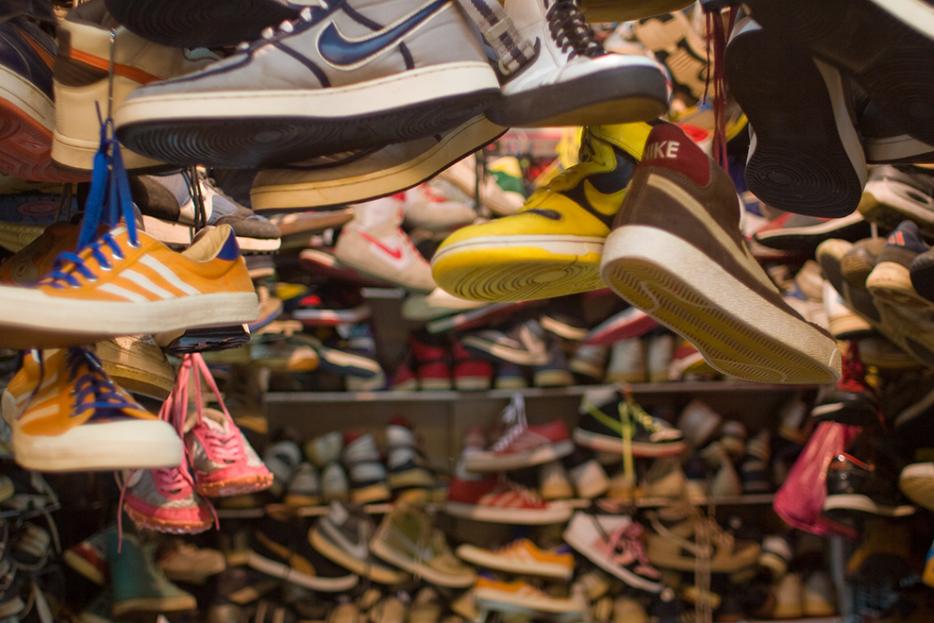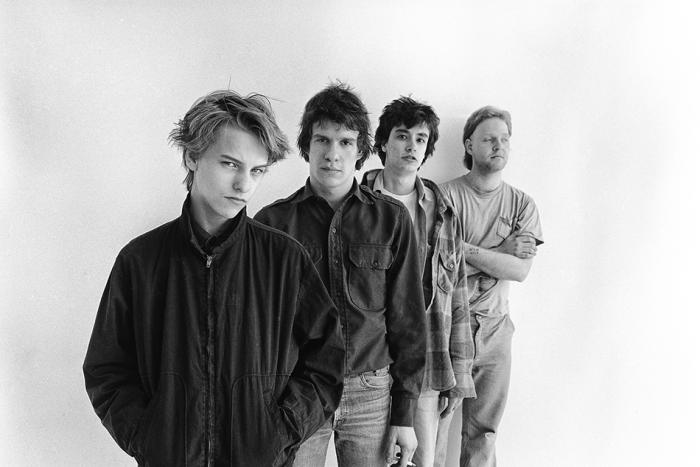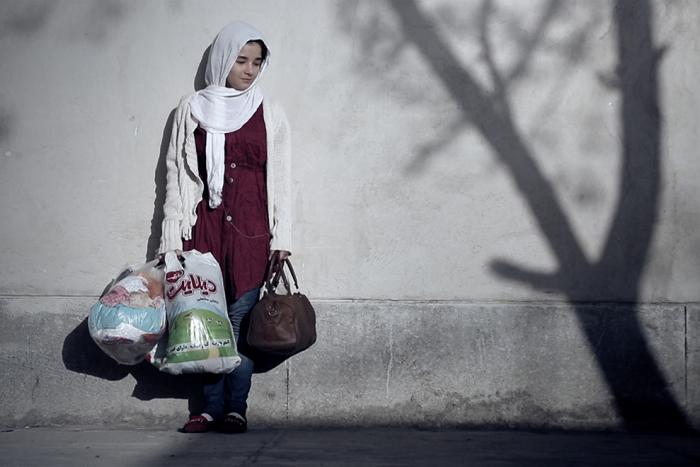In Chatuchak, Bangkok’s largest outdoor market, smells compete. A bleachy chemical tang replaces a foul suggestion of powdered prawn. This is where you'll find luxury of spurious origin—Mulberry bags, Lacoste polos, and Tom Ford perfume. There are also pets (lordly tortoises and exhausted rats) and snacks (garlicky sour sausage and thick guava juice). And there are chickens, which, I guess, straddle the pet-snack conceptual divide.
Chatuchak is a great mass of torsos swivelling in response to an abundance of stimuli. All the bodies create a constant cascade of spatial problems, which are solved immediately and inelegantly by seemingly involuntary amoeba-like movements of the general throng. It never feels like you’ve chosen to be where you are.
On this day at Chatuchak, Jennifer, a felicitous middle-aged Welsh woman on vacation, was going through a scary ordeal. She was buying gifts for her nephews in London, who had humiliated her last Christmas, when she gave them fake Paul Smith socks that they immediately threw in the garbage. They instantly knew the socks weren’t genuine. She didn't really understand any of this. She grew up pretty poor—when she was a kid, anything that wasn't black with coal was a nice outfit. She had no idea what made a sock anything other than a foot containment device. She was sweating gallons, trying to think like a pubescent aristocrat.
Taylor was from Utah. He had one of those meaty faces that you immediately trust—I suppose because mass is inherently trustworthy. He was wearing a fanny pack below his sleeveless black tee so I assumed he wouldn't care about the authenticity of the Louis Vuitton bag he was buying his sister. I was wrong. He wanted to give her "the fucking stupid thing she really wants"—luxury, he said, was all about stupidity. But what really confused Taylor was that the rich kids back in Utah cared less about being rich than he did. They ate 7-Eleven hot dogs leaning on their beautiful cars. Having real money meant money meaning less. "They were just okay with that stuff," he said, with a zoological tone in his voice. "It's almost like they had an inherent sense of self-worth, or something."
Counterfeit clothing is illegal in Thailand theory, but in Thailand practice, all legality feels dangerously fluid. A drug possession charge will get you years of jail time, complete with leg irons, while tourists scream enthusiasm about bars in Pai where hallucinogens are available over the counter. Porn is largely censored, but the blowjob bars are many. If you're an unscrupulous criminal resembling this writer not one bit, you can ride a motorbike without a license, ripping through humorously dangerous traffic along a snaky mountain road. So, regardless of the law, everyone wears counterfeit everything—like a trio of panhandling children I saw wearing beautiful matching New Balance shoes.
In downtown Bangkok, MBK mall is where the real action is. It's a place where it's actually difficult to buy something legitimate. If you're tired of Starbucks coffee, you can go to Star Back Coffee, right next door. You can buy Dior shades that are totally believable except for the words "so real" stenciled on the insides of their arms. Y'know, in case you were wondering.11Correction: Dior does indeed stencil So Real on the arms of some of its sunglasses. The So Real glasses referred to in this story, however, are fake.
Some of the fakes at MBK are eerily accurate. There are imitation Burberry briefcases costing about as much as decent moisturizer that nevertheless exude British expensiveness. Others are as convincing as the paper version of a plane.
The really hallucinatory thing about MBK is that prices bear no relation to quality whatsoever. I saw, for example, maybe a dozen different fake pairs of a certain Prada shoe, which were all—despite being wildly various in quality—the exact same price. A silk fake Armani tie is no more expensive than a rayon fake Armani tie. This seemed absolutely insane at first—but it actually makes perfect sense.
Say we've got two counterfeiters: Larry and Curly. Larry sells excellent fake Chanel bags. He has them made by skilled people in Vietnam. He charges $50 for them, making a decent profit off each bag. They sell well. Meanwhile, at the next stall over, Curly sells positively abortive fake Chanel bags. They are essentially branded plastic boxes. Curly makes them in his garage with his nephew. However, he matches Larry's price of $50, because price is a mark of legitimacy. If Curly's bags were on sale for $5, nobody would buy them, for the same reason that you wouldn't buy a jam roll for a penny: it would feel suspicious, like it was made by someone intent on poisoning children. Curly sells fewer bags than Larry, but Curly still manages to sell a few to people who aren't paying much attention. Each shitty bag Curly sells nets him an outrageous profit. He's a highly successful fraudulent fraud.
Quality also varies in Pantip Plaza, the place where the computer stuff goes: shiny new machines all over a squat dirty sprawl. It’s three malls over from MBK—central Bangkok is basically a forest of vertical shopping opportunities. The smell of cat pee flows around its malfunctioning escalators. The day I was there, they were filming a commercial in which an American GI shoots at a bosomy Santa in booty shorts while a robot sulks sadly in the background. I was with Courtney, a clever woman with a sly smile who ran away with me to Thailand for no discernible reason. She wanted a fake iPhone after we met someone who bought a perfectly-operational-you'd-never-guess-it-wasn't-real model for $20. We wondered what kind of subtle insinuation she'd have to mumble to obtain such a thing. "Do you have iPhones?" she said to a guy at the stall. "Real or copy?" he replied.
The product Courtney received seemed genuine at first. It looked as pretty as an iPhone should. But it soon refused to do much of anything. When she tried to open crucial applications, the phone responded with the koan-like error message "Resources are not shelves." Bikini'd women appeared in unbidden windows. She had to hit the screen hard to make it acknowledge her. The phone invited her to play a game of Look After Your Stone, where you take care of a pebble, by, for example, buying a piece of meat for it to cuddle.
It was about this time, while Courtney was loudly considering maiming the unit, when I started wondering why I gave a shit about all of this.
*
It's hard to know what to do with the fact that you can buy shoes studded with over four hundred diamonds in a world where hundreds of thousands of people are dying of diarrhea. Sure, frivolous displays of wealth seem ugly—I think we can all agree that the rich kids of Instagram are a bunch of worthless ass wipes who deserve years of chokeholds—but locating the exact horizon of frivolity seems impossible. We might feel bad about our own indulgences, but since we're not, as a society, giving up our Himalayan finishing salts anytime soon, no individual person has a strong incentive for self-sacrifice. However you might feel about the injustice represented by a $300 meal, it’s quickly replaced by the real prime directive of human behaviour: don't be weird about the stuff your friends do.
The most beautifully decorated house I've ever eaten in was owned by a professor who earns a living writing, smartly, about capitalism. I know a lot of people back home who occasionally post socialist screeds on Facebook yet wear extremely expensive clothing they can't really afford. These people cultivate considered displays of wealth in a way that betrays cognitive dissonance: you want to look prestigious but also look like you don't care about crass mainstream commercial standards, or vulgar common culture. So the pricy shirts are oddly sacklike, made of lovely material resembling cheap sweatshirt fabric, or the alcohol is quirky Chartreuse rather than a big California cabernet, or the haircuts are strange but the shoes are amazing.
Why do I know that Margiela isn't a brand of margarine?
This is a weird juxtaposition: people desiring the appearance of mainstream wealth buy imitations of rich people things, but people who want to look like they’re above all that buy very costly clothing that elegantly attempts to say nothing. You avoid stuff that seems characteristic of the moneyed, but you still spend a lot of money.
I'm no different. My big thing is cologne, because I feel like it's the most monetarily efficient source of totally unearned charisma. I wear this strange stuff that I imagine smells like Wonder Woman's hair after she's exerted herself fighting Nazis. It was as costly as that sounds. My consciousness has entertained hours of mental gymnastics about why buying this was reasonable. I mainly justify it by pointing out, to myself, that it's important I make a good impression when I meet important editors who might pay me for my feelings. But this is ridiculous: I know lots of successful people who smell like nothing in particular. The internal wrangle isn't about sober reflection; it's evidence of a neurosis.
*
Counterfeit goods could be seen as a way of solving this consumerist dilemma. By buying fake stuff, you access the status of wealth while leaving your bank account still capable of charity. You walk among the anointed without the obscenity involved in the anointing process.
However, that seems like a false promise, because wealth is about more than just having a few precious bottles. There's something spiritual about the rich people I know, a quality enough money confers that I'll never have. The rich people I've met have a grace: a sense of security emanating, perhaps, from a lack of threat. They don’t twitch at every instantiation of reality as if approached by an ocelot. They fall slowly around the room; they lilt gradually, accepting the world’s graces. They emit the aura of almost always being okay, even if they're wearing nothing at all.
You can call this being insensate if you want, or call the lives of the rich boring. But I would rather be insensate than be anxious, which I am. I attempt to approach as few objects as possible, worried I might break or otherwise sully anything around me. If I wore fake Dolce & Gabbana jeans, I would memorize their every flaw, even if they had none.
I was once in love with someone who owned amazing towels. She had thick, good, expensive towels everywhere. This was the product of her celebrated attorney father's seeming obsession with making things dry. When he took me for dinner at the yacht club, he mentioned that the club gym had great towel service. He said if I got wet on the boat ride, he could always send me home with a nice towel.
I was not especially dry as a youth. I remember permeable shoes in the pouring rain. I remember the musty house I grew up in. I was never hungry poor. But my life took place in what felt like one windowless room—there were no vacations. My parents gave me a buck for a Snickers bar every week. I remember the first time I had one. I was amazed at what a dollar could buy—it seemed unbelievable that a team of strangers could figure out exactly what I wanted to melt with my tongue.
Extremely rich poet Frederick Seidel once wrote, "Literally the most expensive hotel in the world is the smell of rain about to fall." The line's meaning, to me, is clear: no matter how much money you have, the experiences you most value will be the most vanishing. This seems somewhat correct. But everyone has epiphanies—they're cheap. As William James observed, a person’s specific sadness creates a happiness that exists for them alone. We all have incandescent moments. I want Japanese toilets. I would prefer to think less about paying for the room where I sleep off the soul's priceless highs.
*
I started being weird about money because of something my uncle James said one day when I was a kid. He asked me how much money there would have to be at the bottom of a barrel of diseased shit for me to want to jump in after it. I said fifty bucks. That was the wrong answer. That night, he silently gave me a tight small wad of bills in a dark hallway.
Money's melancholy is a different thing than the dread of being broke, which I'm currently free from. At one point, though, earlier on in life, I constantly felt numbers dancing in my head—two bucks for broccoli, three bucks for a bus ride—all these small numbers, threatening to swing up around me like a net. And now I do not. What I'm talking about here is different. It's knowing there's a beautiful party with free cigarettes in a warm palace filled with lush conversations happening atop a mountain you can't quite climb.
This is a strange feeling I saw frequently when working at a fancy-ish wine bar in Toronto. A lot of people came in who could barely afford to eat there. You could tell these people by the way they sized up the wine menu, as if it were a keyhole they shouldn't be looking into. Rich people walk in, say "Barolo" because that's expensive then order a steak. Wealthy people are easily served—they treat their server as a trusted friend. Less fortunate people spend half a summer night Googling reliable Italian wines, then stammer over words like "frappato." Nervous anticipation plays along their faces, as if you're unwrapping their effortful gift. You can tell they’re wondering whether you’re going to screw them by selling them something overpriced, or judge them for buying something underpriced. Along with the smell of rain about to fall, the most elusive experiences will be the moments where they almost felt like they were very well off, during their first bite of an exquisite anchovy.
*
It's weird how we've all been programmed. Why do I know that Margiela isn't a brand of margarine? Much as I've tried, I can't locate the specific moment I started wanting what I want but can’t have and don't need. There's all this garbage in my head. It's even in my mouth, which usually drinks Coke, yet prefers Pepsi when I'm wearing a blindfold. This information doesn't affect my life, because I don't plan on drinking soda with a blindfold. A Macy's Hotel Collection blanket will feel softer than a Wal-Mart one, even if their thread count is equivalent. In Nikes, you'll dance more confidently than you will wearing knock-off Nikes—perhaps attracting someone you'll dance with for years to come.
There's no way to get out; there are only more or less artful ways you can fake it. So, if you're ever in Thailand, buy someone you love a counterfeit Yves St. Laurent sweater then never tell them about where you got it. Because the moment they know what it really is, it won't feel quite as good. You already keep a lot to yourself, I imagine—you don't tell them about the little things they do that irritate you. You don't let them in on which of their problems you're tired of hearing about.
You can make someone you love feel warmer, as long as you're willing to keep a secret. To me, that's as genuine as you can possibly be.






